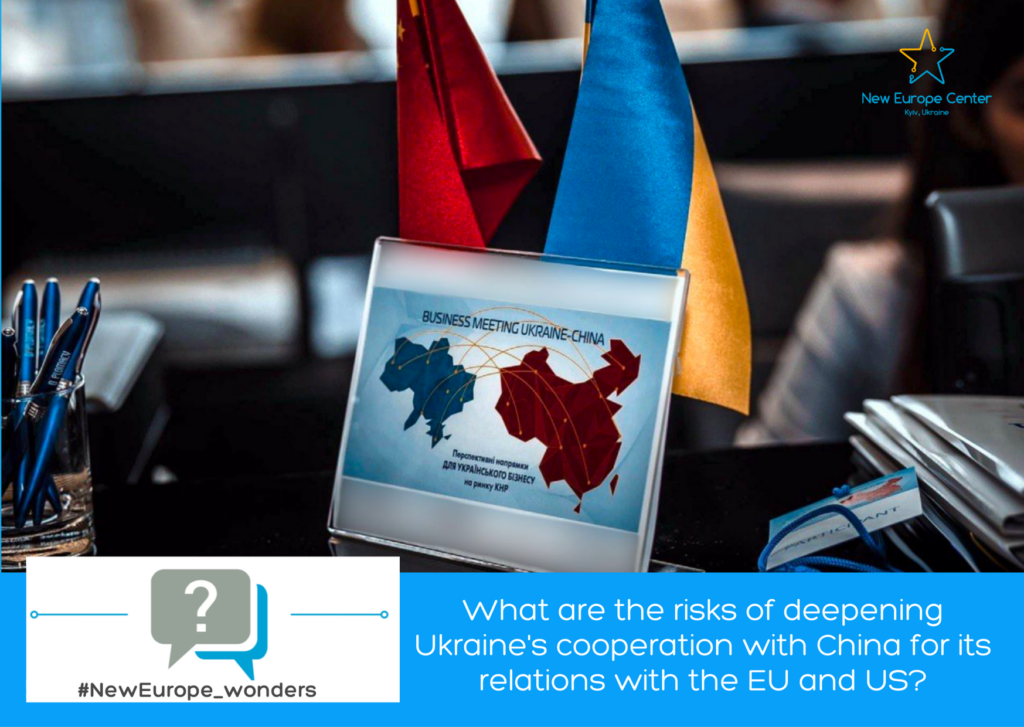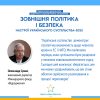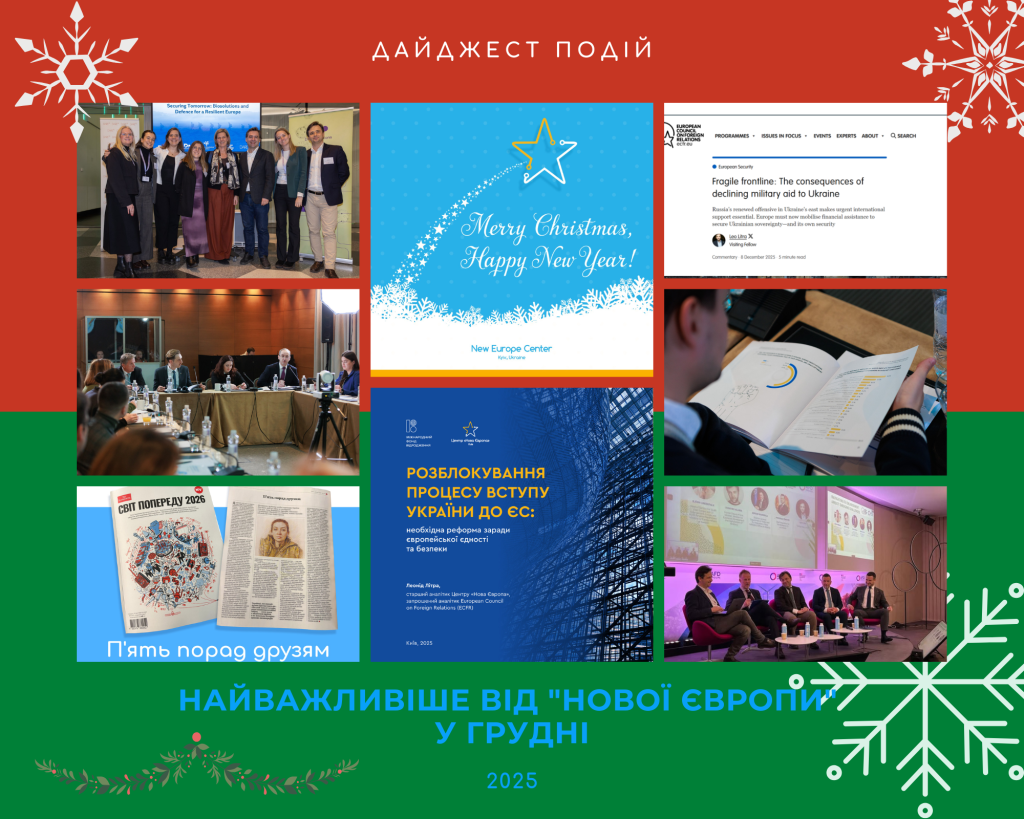The paper is written within the rubric “New Europe Wonders” .
Please find the PDF-version of the research here.
In what areas should Ukraine develop cooperation with China without risk of losing EU and US support? What forms of partnership with China are sensitive for our partners? Will US policy towards China change after the 2020 presidential election, and how will this affect the development of Ukrainian-Chinese relations? What is the EU’s policy towards China, and how does it affect Ukraine’s cooperation with China? In terms of the traditional rubric “New Europe Wonders…” our Center received answers to these questions from leading experts from the EU and the US. The survey of foreign analysts is one of the Center’s analytical contributions to the development of Ukraine’s Asian Strategy that has been previously announced by Dmytro Kuleba, Foreign Minister of Ukraine. Besides, New Europe analysts are part of a working group involved in developing this strategy.
“UKRAINE, AS A FREE COUNTRY, SHOULD NOT HESITATE WHICH SIDE IT IS ON”
Roland Freudenstein, Policy Director, Wilfried Martens Centre for European Studies, Belgium
Deepening cooperation with China, especially for cash-strapped, East European countries, is a risk in itself. The Communist Party of China is nobody’s friend, nor true partner; it wants to dominate the world and undermine liberal democracy. It uses investment in strategic infrastructure, elite capture (cultivating powerful individuals), political blackmail, cyberattacks and disinformation, as we have seen in recent years, and especially in the COVID-19 pandemic. The Chinese Dream is turning into a Chinese Nightmare. Deepening relations with China, except if done from a robust position of strength, will certainly jeopardise relations with the US – a country in which opposition to China’s new imperialism is the last big topic which unites the Republican and Democratic parties. But the EU is waking up to China’s threat very quickly, too. We may not want to completely decouple from China. But the times are past when we wanted to deepen our relationship with China unconditionally. Now we’ll be very selective, and more staunchly reject Chinese attempts to weaken our democracies. This is not just a geopolitical struggle between the West and China. This is freedom vs. authoritarianism. Ukraine, as a free country, should not hesitate which side it is on.
“PUTTING ASIDE CHINESE INVESTMENT IN TECHNOLOGY…”
Florent Parmentier, Secretary General, the Center of political researches of Sciences Po (CEVIPOF), France
Ukraine needs to diversify his partners, combining access to EU markets and European political support, a US diplomatic and military support and relations with other key players in order to strengthen its negotiation position with Russia. China is a player with a strong ability to invest in the Ukrainian economy, as it has already done in other Central and Eastern European countries. Yet, the rising tensions between Washington DC and Beijing has two strategic implications: it diminishes the status of Russia as ‘the favourite rival’ for the US, and it makes an economic rapprochement with China more difficult at a time when Ukraine desperately needs investment. Should it follow Poland’s example (an alignment with US position in the technological field) or follow its own path? EU finds it difficult to have a unified view on this issue, some countries (Italy, Greece, Hungary, etc.) being labeled as ‘panda-kissers’ while others are more skeptical. Putting aside investment in technology, Ukraine would take advantage in discussing with all the international players and doing business in sectors which do not threaten its digital and technological sovereignty. The latter is now at the top of EU agenda and there might be a common ground of discussion and action with EU partners.
“IF UKRAINE WERE TO PURCHASE 5G EQUIPMENT FROM PRC FIRMS LIKE HUAWEI, PROSPECTS FOR UKRAINIAN INTELLIGENCE COOPERATION WITH NATO COUNTRIES WOULD SUBSTANTIALLY DECLINE”
Richard Weitz, Senior fellow and Director, the Center for Political-Military Analysis at Hudson Institute, USA
Concerns about China’s ambitions in Europe have been growing substantially in the United States, Canada, and many other NATO members. In the United States, this concern has become bipartisan, shared by both the current Trump administration but also leading Democrats. If Biden were to become president, he might adopt a softer style, and even resume climate change cooperation, but the structural sources of PRC-US tension would persist.
Meanwhile, China has increasingly antagonized European states through its Wolf Warrior diplomacy of pressure against Sweden and other EU members. The bloc’s 2019 EU Strategic Outlook described China as a rival. EU governments have joined US is expressing concern about Beijing’s human rights and civil liberties policies, including regarding Hong Kong and Xinjiang. COVID 19 has only accelerated concerns about China that had been building in the West for years. Now China’s clumsy “mask diplomacy” has backfired and led the EU to develop a counterinformation strategy to counter malign narratives from China as well as Russia.
China’s merging of economic and security issues makes it harder for Ukraine as well as other states to compartmentalize economic ties with China and security ties with the EU and US. Ukraine could subject itself to the strong US extraterritorial measures adopted to limit technological flows that could aid China’s military-civilian fusion strategy. Under previous governments, weapons sales from Ukraine to China helped the PLA develop more powerful naval and air forces that now threaten the US and European forces in Asia, as well as India, Japan, and other Asian countries. If Ukraine were to purchase 5G equipment from PRC firms like Huawei, prospects for Ukrainian intelligence cooperation with NATO countries would substantially decline.
“BEST BLOCK MOTOR SICH SALE”
Michael Emerson, Associate Senior Research Fellow, Centre for European Policy Studies (CEPS), Belgium
Ukraine should be open for business with China, but with precautions. China is a huge market for Ukraine’s agricultural exports. With its recent land reform measures, creating now a market for privately owned land, Ukraine should get onto a course of major expansion of its farm sector. Neither the EU, nor Russia nor the US offer opportunities for big increases in agri-food exports. Ukraine will take precautions to prevent China buying up its farm lands.
Ukraine is interested in transport corridors to Asia that bypass Russia, and here China’s Belt and Road initiative may be useful. But beware of Chinese loans for infrastructure projects of dubious cost-benefit value. There are too many examples of countries in Asia and even in the Balkans (e.g. Montenegro) which have over- indebted themselves to China.
Then there is the case of the Motor Sich manufacturer of helicopter engines, bought in principle some time ago by Chinese interests, but currently stuck in the anti-monopoly agency’s in-tray. Best block this, since otherwise this investment will cost a lot in terms of US goodwill these days.
These precautions should also be carefully explained to the EU, which are close to EU policy on China, so as not to undermine EU support for Ukraine. Avoid Serbian Vucic-style Chinese propaganda.
“INVESTING MORE TIME, ENERGY AND PERSONNEL IN THE DIRECTION OF CHINA WOULD BE THAT THE RESOURCES DEVOTED TO THE WESTERN DIRECTION WOULD BE REDUCED”
Susan Stewart, Head of the Research Division on Eastern Europe and Eurasia, German Institute for International and Security Affairs, Germany
It is certainly understandable that Ukraine intends to pay more attention to Asia, and to China in particular, in its foreign policy. China has become an extremely influential actor in the international arena and it is important to develop a coherent approach towards it. However, in recent years Ukraine has developed a strong relationship with both the European Union and the United States. Since the resources allotted to Ukrainian foreign policy are very limited, one serious risk of investing more time, energy and personnel in the direction of China would be that the resources devoted to the western direction would be reduced and existing relationships would suffer. This could send a signal to the EU and the US that Ukraine is less interested in them as partners, which could lead them in turn to devote fewer resources to Ukraine. As far as I am aware, Ukraine does not yet have a strong base on which to construct its relations with China. So it could end up making itself extremely vulnerable by weakening support in the west without compensating for such support in the east. Pursuing a “pivot to Asia” thus seems to involve high risks unless Ukraine is willing to invest many more resources into its foreign policy than it has done so far.
“INTENSIFIED COOPERATION WITH CHINA COULD BE INTERPRETED AS CHOOSING THE ‘WRONG’ SIDE”
Ivana Karásková, Ph.D., Founder and Project Leader, MapInfluenCE and China Observers in Central and Eastern Europe (CHOICE), the Czech Republic
China’s approach to Central and Eastern Europe (CEE) has been a targeted mixture of carrots and sticks, with inducements preceding coercion. The experience of other CEE countries shows that while China comes with economic promises (sometimes lots of them), these have seldom materialized in a form beneficial for the recipient countries, such as in brownfield or greenfield investments creating employment for the local population or high-quality infrastructure. In the political domain, China has focused on directly communicating its interests to local representatives. However, the scope of issues China habitually denotes as ‘core interests’ has been widening, from originally communicated concerns over territorial integrity (Taiwan, Tibet) through South China Sea to recent defense of technological companies (Huawei’s involvement in building 5G networks). During the coronavirus epidemic, Beijing also started exploring and utilizing regional networks of influence (e.g. ‘alternative’ media) previously established by Russia. In the current context of increasing tensions between China and the US (as well as China and the EU) and an apparent bifurcation of the international system, Ukraine should take into account that intensified cooperation with China could be interpreted as choosing the ‘wrong’ side.
“COOPERATION WITH CHINA HAS SEVERE SIDE AND ADDICTIVE EFFECTS”
Gustav C. Gressel, Senior Policy Fellow Wider Europe Programme, European Council on Foreign Relations (ECFR), Germany
Economic cooperation with China may seem lucrative: cheap loans under the one-belt one road initiative for infrastructural projects, investments in industries, including the stricken defence and space sector, quick and cheap expansion of digital infrastructure, particular 5G mobile data connection. But like every drug, it has severe side and addictive effects. They first and foremost concern Ukraine itself: Chinese loans – although offered without conditionalities and hence attractive for political leaders – have proven a financial trap in many countries. The infrastructure that was created never gained the revenue to pay off the loan, and the property then ended up in Chinese hands, without giving local authorities a hand in how, if and for what it will be used. Chinese investment often turned out to be a shopping spree to by up technology and sill and transfer it to China – at the end without sustainable benefit for local industries.
And then, there is the ‘geopolitical’ dimension. The Trump administration often hit the headlines when it demanded European allies to refrain from using Chinese 5G components. But in fact, the Trump-administration’s approach to the emerging technological cold war with China is still casuistic and chaotic. Washington’s policies will get more structural, coordinated, and coherent under any post-Trump administration, as the bipartisan consensus that the US is in a systemic competition with China that will be decided by the ability to maintain technological and industrial leadership. And then, the United States will carefully examine each country, authority (intelligence service, armed forces, etc.), and enterprise in which data-environment they are operating, which vulnerabilities to Chinese espionage they might have, which links to China would pose a risk to US technology, and which safeguards are in place that delivered goods, services, and information will not be passed on to Chinese hands. And that will determine which information US intelligence shares with Ukrainian counterparts, which weapon systems it is willing to give or sell, which manoeuvres it may hold in Ukraine, whether it will or will not invest in Ukraine’s defence-industrial sector, and whether US IT enterprises will be allowed to outsource IT services and programming to Ukraine’s thriving IT sector. All these issues are not trivial to Kyiv.
In Europe, China’s reckless propaganda during the Corvid-19 crisis and its recent moves against Hong-Kong has led to a re-evaluation of China and its role. As bad experience with Chinese trade-practices, investment, technology theft, and interferences in domestic affairs mount, the previous openness to Chinese enterprises is questioned and requests for a tougher line mount. Said that, the European response ich much more muted and ambiguous than the American, and given the nature of European politics (that is by en large by consensus) and the lack of strategic vision, it will remain to be so. Furthermore, Europeans are extremely hesitant to call out threats. Hence the European action with regard to China will be less visible and public, but never the less it will affect Ukraine. The EU will change and adopt some of its regulatory frameworks to retaliate against Chinese unfair practices and to restrict Chinese access to European cutting edge technology. Investment screening now in place is only the beginning. Needless to say, that via the DCFTA implementation, these regulatory changes will sooner or later reach Ukraine and will force Kyiv to make a decision to implement them as well (facilitating EU investment but angering China) or not (pleasing China but creating hurdles for European investment).
With China becoming Ukraine’s single most important trading partner, all of this is hardly good news. But again, Ukraine does not need to break relations with Beijing, it just needs to be very careful: careful in what kind of language it uses in dealing with China, and careful with regard to investment, critical infrastructure, security, data-transparency, and regulatory integrity. Up-front liaison with Washington and Brussels on pending decisions and their implications would be recommended, as they will save Kyiv from jumping into the crosshairs of an intensifying tech-war.
The paper was written within the Think Tank Development Initiative for Ukraine (TTDI), carried out by the International Renaissance Foundation in partnership with the Think Tank Fund of the Open Society Initiative for Europe (OSIFE) with financial support of the Embassy of Sweden in Ukraine.
The views and opinions expressed in this paper are those of the author and do not necessarily reflect the position of the Embassy of Sweden in Ukraine, the International Renaissance Foundation, and the Open Society Initiative for Europe (OSIFE).








